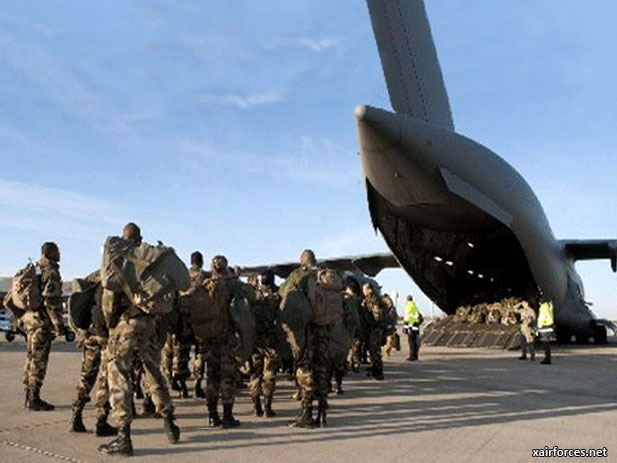
French planes destroy Islamist bases in Mali

French warplanes destroyed two Islamist bases in northern Mali as a leading Al-Qaeda-linked group in the region split Thursday, with the breakaway group saying it wanted talks to end the French-led offensive against the militants.
The bombing raids overnight targeted Ansongo, about 80 kilometres (50 miles) from the town of Gao and extremist bases in the nearby village of the Seyna Sonrai, a Malian military source said on condition of anonymity.
"French military planes successfully attacked Islamist positions at Ansongo and nearby areas," the source said. "The strikes were very successful and caused damage to the enemy."
A security source in Niger confirmed the raids, saying "two main bases of the Islamists were destroyed" as well as their fuel stocks and armoury.
More than 2,000 Chadian soldiers and 500 troops from Niger are being deployed at Ouallam in Niger, near the Mali border, to open a second front against the Islamists as part of a UN-mandated African force to boost, and eventually take over, the two-week-old French-led campaign.
The first of the 6,000 troops pledged by African nations to support France started heading north, moving closer to the areas a trio of Al-Qaeda-linked groups seized in April in the chaotic aftermath of a coup in Bamako.
But cracks emerged in the rebel front when a faction announced it had broken away from Ansar Dine (Defenders of the Faith).
The newly-formed Islamic Movement for Azawad said in a statement it "rejected all forms of extremism and terrorism and was committed to fighting them," adding it wanted a "peaceful solution" to the Mali crisis.
It said the new group was composed entirely of Malian nationals and called on Mali and France to cease hostilities in the zones it was occupying in the northeastern regions of Kidal and Menaka "to create a climate of peace which will pave the way for an inclusive political dialogue."
-- Timbuktu a 'ghost town' as Islamists leave --
Officials and locals in the fabled Mali town of Timbuktu said the Islamists had fled following French air raids over the weekend which destroyed their headquarters -- a mansion belonging to Libyan former strongman Moamer Kadhafi -- as well as their fuel stocks and arms.
There was no water or electricity for three days as the Islamists kept supplies running with a generator, they said.
"The people have left and the Islamists too. It's a ghost town," said municipal official Moctar Ould Kery.
The UN has authorised the deployment of a 3,300-strong force under the auspices of 15-nation West African bloc ECOWAS. The involvement of non-member Chad could boost its numbers by another 2,000.
France has already stationed 2,400 soldiers on the ground and their number will rise to 3,700, the defence ministry said.
France's surprise decision to intervene on January 11 has received broad international support with continental powerhouse South Africa the latest country to give its backing.
"From the French perspective, the issue in Mali was a terrorist threat involving Al-Qaeda in the Arab Maghreb which posed a threat not only to neighbouring countries in Africa but also to European countries," deputy foreign minister Ebrahim Ebrahim said.
But there has been increasing alarm about reports of rights abuses by Malian soldiers on ethnic Tuaregs and Arabs.
The International Federation of Human Rights Leagues said at least 31 people were executed in the central town of Sevare, and some bodies dumped in wells, according to local researchers.
Two Tuaregs were also executed by Malian soldiers in the central town of Niono, it said, calling for an immediate independent inquiry to "determine the scale of the abuses and to punish the perpetrators."
Human Rights Watch said its investigators had spoken to witnesses who saw the executions of two Tuareg men in the village of Siribala, near Niono.
It also said witnesses had reported "credible information" of soldiers sexually abusing women in a village near Sevare, and called on the government to urgently investigate.
Mali's crisis began when Tuaregs revived a decades-old rebellion for independence of the north, which they call Azawad.
They allied with hardline Islamists and seized the key towns of Kidal, Gao and Timbuktu in a matter of days. The Islamists later broke with the Tuareg and have imposed a harsh form of Islamic law in the north.
Source: By AFP (nation.co.ke) News - 25 January 2013
Photo: This handout picture released and taken on January 22, 2013 by French Army Communications Audiovisual office (ECPAD) shows a C-17 military transport aircraft of the US Air Force (USAF) at the French military air base in Istres, southern France, carrying troops and military equipment to Mali as part of the French military operation codenamed Serval. (Photo by AFP NATION MEDIA GROUP)
(26.01.2013)
|